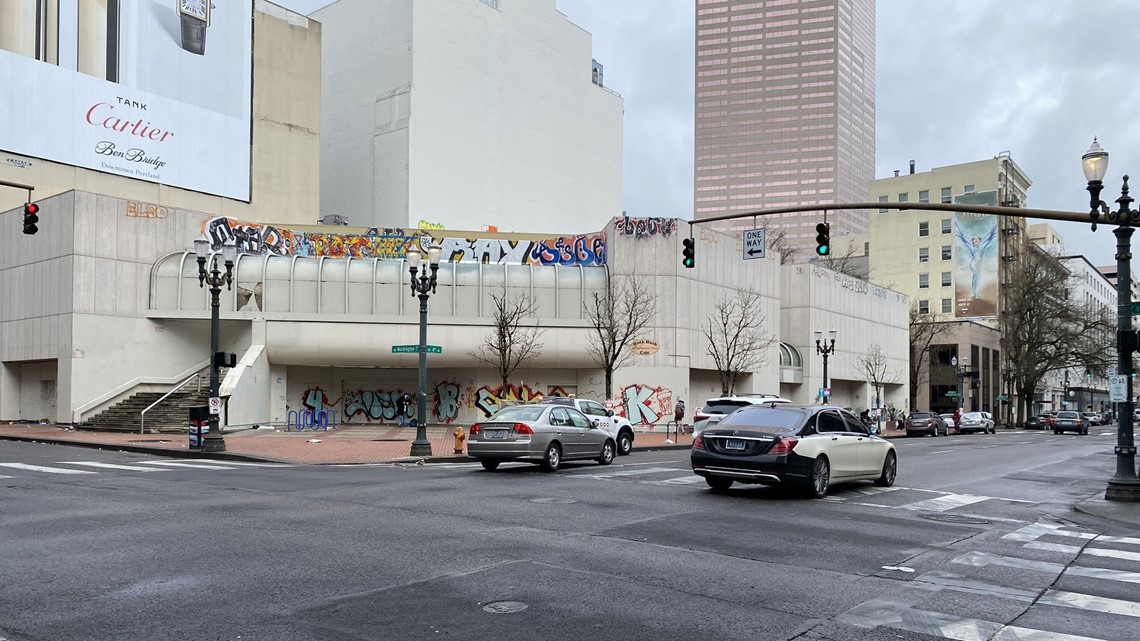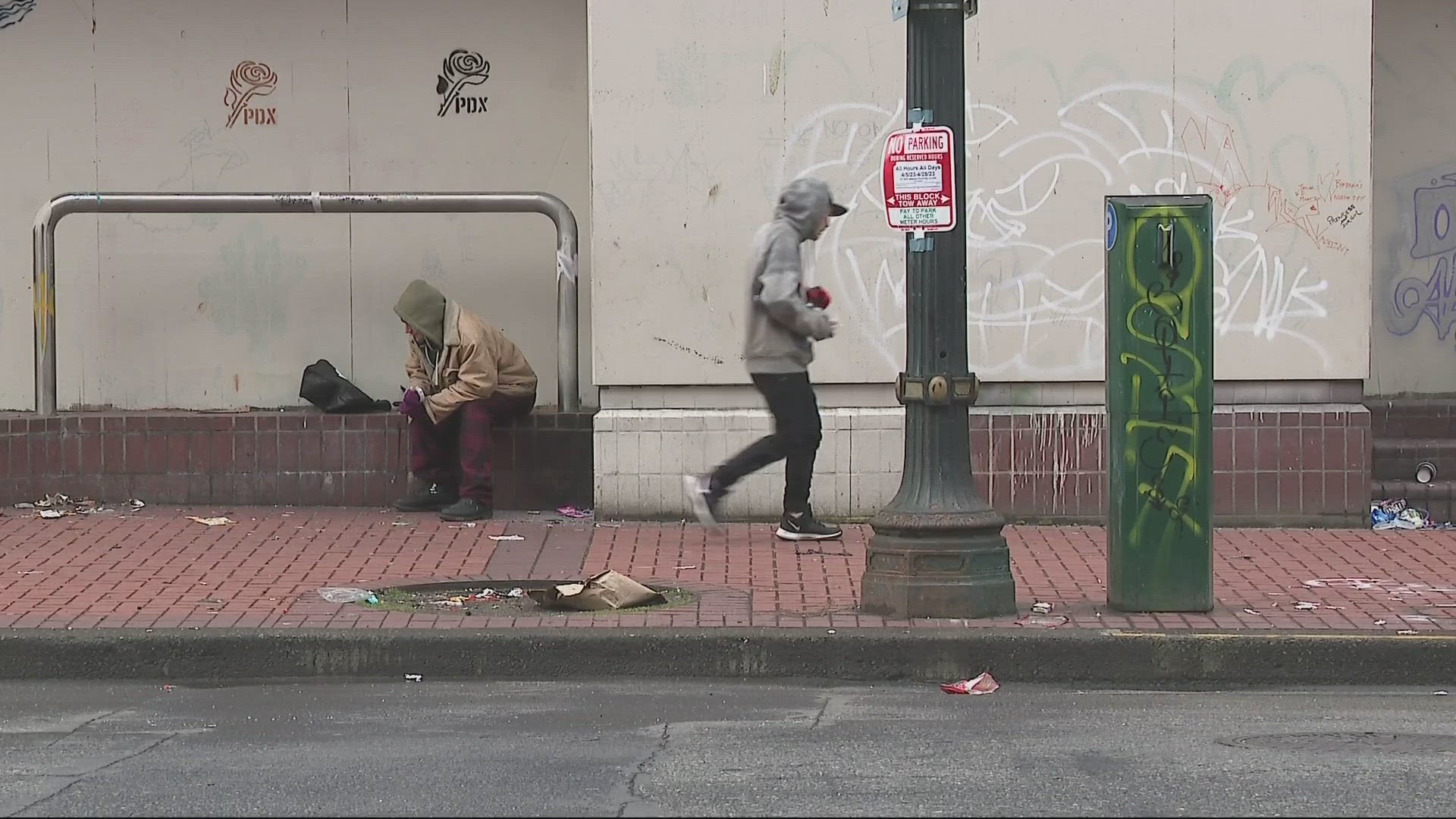PORTLAND, Ore. — The drug crisis on Portland’s streets was on full display Monday morning along Southwest 4th and Washington. Dozens of homeless people huddled around the walls of a vacant, graffiti-covered building. They passed around scraps of tin foil covered in fentanyl as they each took a hit.
This area of downtown is a "top concern" for Portland police and the mayor’s office, officials said. Since Friday, police have responded to at least 11 overdoses in the area. Three resulted in death.
“It’s not what you think. It is not fun. It's literally the devil and it’ll take you,” a young man named Nate told KGW.
Nate overdosed Sunday night but was revived by police after they used three doses of Narcan on him.
“I just took a really big inhale of fentanyl and I guess I went out and I woke up to a bunch of people surrounding me and swarming me," he said. "It was one of the worst feelings and most traumatizing experiences that I ever endured — honestly I don’t recommend ever picking up fentanyl.”
Nate just turned 22 years old and has been addicted to fentanyl for the past six months. He said his addiction started after he injured his arm and doctors prescribed him pain medications, which eventually led to his fentanyl addiction.
Sunday night was the eighth time he’s overdosed. He said that he'd smoked fentanyl as many as 25 times since then — all before noon on Monday.
“It makes me feel like I don’t really have a choice,” he said, beginning to fight back tears. “I feel a little bit guilty because I know my mother wants better for me and I wish I could just give it to her.”
Inside his pockets, Nate kept what he considered to be the essentials to surviving on the streets: a knife, baggies of fentanyl pills and powder, tin foil, a straw and Narcan.
“I want to detox really bad. I want to get off fentanyl,” he said.
KGW reporter Blair Best called an outreach worker from Cielo Treatment Center and connected him with Nate. Cielo is now working to get Nate a bed at Fora Health.
“I feel a little bit better. I feel that maybe I’ll get the help that I need. I just got my hopes up,” Nate said.
Washington Center, the epicenter
The vacant building at the center of this weekend's web of overdoses has become a chronic bugbear for Portland police and the city. The site itself, Washington Center, is privately owned by Menashe Properties. According to the property owner, the last tenant was Verizon, which occupied a full floor of one of the buildings.
Ross Kelley, a principal at Menashe Properties, said in an email to KGW that Verizon moved out at the beginning of March 2023 with almost three years left on their lease. They had been a tenant since 1995 and cited safety and security concerns.


In recent years, Menashe Properties has offered use of the building as a homeless shelter in partnership with the city and Transition Projects. The company said that it offered to donate it again in 2022 for a temporary homeless shelter but did not hear back from the city.
The mayor’s office told KGW over the phone that they have been in communication with both the property owner and police to find ways to secure the building, which could include blocking off its alcoves to make it less inviting.
“It is extremely disheartening and sad to see what has happened around the property," Menashe's Ross Kelley said in a statement. "Since the passage of Measure 110 and the District Attorney’s decision to not prosecute certain types of crimes, we have seen a dramatic increase of crime and vandalism at this property.”
Portland’s Bureau of Development Services has cited the building owners four times for violating city codes, including for broken windows, human feces, trash, homeless camping and raw food. Last week, the BDS Property Compliance Team, along with the city’s building official and people from Portland Fire & Rescue, police and the mayor’s office walked through the building and created a “board-up plan” for the owner.
Portland Police Bureau spokesperson Sgt. Kevin Allen told KGW in an email:
“Officers find that they make arrests or patrol the area only to find that drug dealers move in right after we leave. We’ll continue to work to address this as best we can from a law enforcement angle, but we know that we’re more effective when we work with public and private partners on creative solutions. We’re happy to work with city leadership and partner bureaus on long term strategies. This is not a new issue for us, and there’s a concerted effort underway to help make a positive difference for the downtown neighborhood.”
'I see it every day'
Across the street from the building is Pete’s Market, the business that Nate overdosed in front of Sunday night. On Monday morning, a worker from Central City Concern was hosing down the entrance to the market — previously covered in trash and the smell of urine.
“I’ve been working here three months and already I’m jaded to the fact that they smoke fentanyl outside,” said Res Tanbert, who works the cash register at Pete's. “I see it every day. I walk by people I don’t know if they’re dead or alive, people trying to resuscitate them coming in asking for Narcan.”
Tanbert believes the city and police are doing all they can to handle the crisis, but their hands are tied since Measure 110 makes possession of street drugs legal in Oregon, at least for small quantities.
And not all fentanyl users on the streets of Portland are like Nate, expressing a desire for help and the means to stop. Ryan, another homeless man with an addiction to fentanyl, told KGW that he doesn't want any help.
“I love this lifestyle. I will never ever take it back for my old life," Ryan said. "I don’t believe I need to go to treatment. I’m happy being a drug addict.”
Logjams in treatment
For the clinics that provide treatment for fentanyl and other substances, the fentanyl epidemic is proving to be a strain on resources and the catalyst for an increase in patients.
In the past couple of years, Fora Health in Portland has seen a major shift from patients seeking treatment for heroin and other opioids to fentanyl. And the crisis has gotten worse — not only in the number of people who need help, but also the severity of their withdrawals.
“It's more difficult for us to manage. They suffer more. We have to send people more frequently to the hospital for complications of their withdrawal,” said Dr. Jennifer Hartley, medical director of Withdrawal Management at Fora Health.
It's becoming increasingly difficult for treatment centers to get enough medications to help in the recovery process. That's because of the increasing demand for those meds and the higher dosage patients now need to treat fentanyl withdrawals.
“Medication is treatment,” Dr. Hartley said. “Fentanyl is a really powerful opiate and medication as a treatment is just so critical. I can't underscore enough how critical it is.”
The need for more equitable access to treatment medication and addiction recovery support is an issue not only in Portland, but across the state. Dr. Hartley said that it has an even greater impact on rural areas, where there are even less resources.
“One thing I would really like to say is that this is absolutely not a disease of one specific population. This is not a disease just of the houseless population, this disease," she said. "Opioid use disorder and fentanyl use cuts across all segments of society. We see people of all age groups. All demographics are affected by this problem.”

